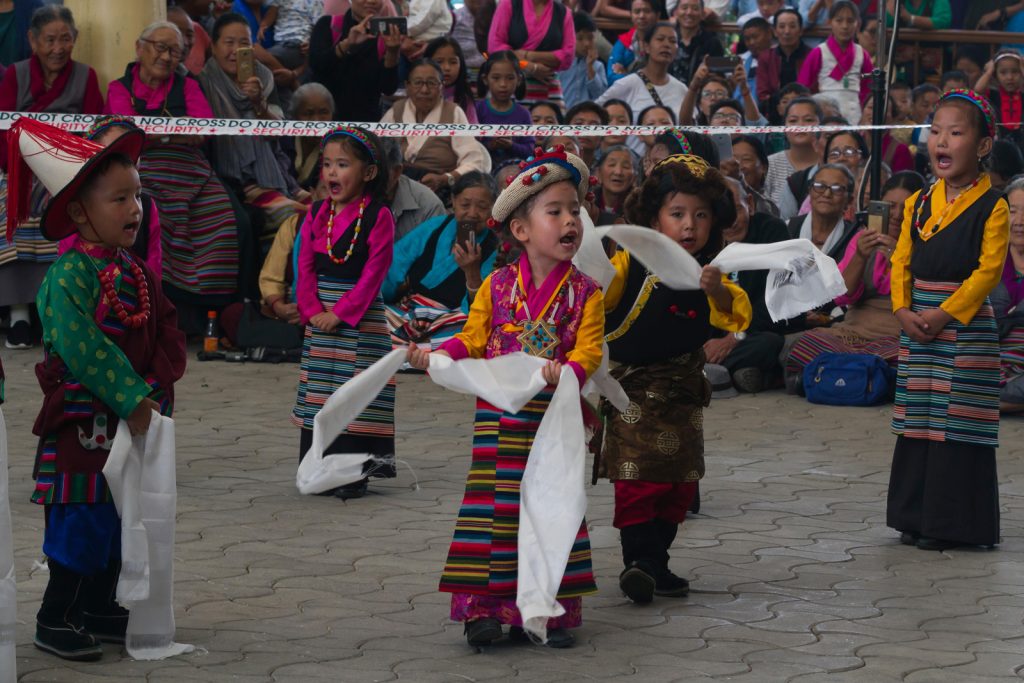Nothing is permanent, so everything is precious. Here’s a selection of some happenings—fleeting or otherwise—in the Buddhist world this week.
Tibetans in Exile Commemorate 59th Tibetan Democracy Day
Tibetans in Dharamsala, India, this week honored the 59th anniversary of the first elected body in Tibet’s history, which took oath on September 2, 1960, according to the Central Tibetan Administration. Tibetans gathered at Tsuglagkhang, the Dalai Lama’s head temple in Dharamsala, for a Tibetan Democracy Day celebration. Speaking at the event, Pema Jungney, current president of the Tibetan Parliament in Exile (TPIE), referred to Tibetan democracy as a gift from His Holiness the 14th Dalai Lama, who introduced the government-in-exile’s system of elections. Jungney also stressed that it is important for Tibetan voters to be engaged in the political process to ensure that they can fully exercise their rights. The 84-year-old Dalai Lama has indicated that he may not reincarnate, raising questions about who would fill his role as Tibet’s central spiritual and political leader. The full endorsement of and participation in the TPIE by Tibetans may prove a key factor in the preservation of Tibetan culture in exile.
Former Nun Lulls Hotel Guests into Sacred Naps
Move over, hot stone massages, sensory deprivation tanks, and crystal sound baths. “Sacred naps” just may be the new trend in immersive alternative healing. At a Four Seasons hotel in Bali, Indonesia, a former Buddhist nun is leading therapeutic sleep sessions, where the “bedtime story” is the awakening tale of Sakyamuni, the historical Buddha. Nun-turned-wellness-mentor Heny Ferawati, who goes by the name Ibu Fera, modeled the Sacred Nap on a method some Balinese mothers use to lull their littles ones, which involves holding their infant in a sarong-like sling, and singing traditional lullabies or telling a bedtime tale, according to a press release by the Four Seasons. While rocking her own baby to sleep, Ferawati had the idea to create a similar experience for adults. Instead of a baby sling, guests at the Four Seasons Resort at Sayan lie in aerial silk hammocks (typically used for special “anti-gravity” yoga classes.) “I combine this with telling the life story of Buddha and chanting various mantras that I learned when I was a Buddhist nun for seven years,” Ferawati said. Ironically, most people fall asleep before the part where the Buddha wakes up.
Buddhist Monk Fights Hate in Myanmar
Since 2017, more than 730,000 Rohingya Muslims have fled to Bangladesh to escape a campaign of ethnic cleansing by Myanmar’s military and Buddhist insurgents, and it would appear that anti-Muslim rhetoric—often instigated by hardline Buddhist monks—has not wavered in recent months. Yet through the Rohingya crisis one monk has continued to speak out against nationalist extremism and the persecution of religious minorities. As part of his efforts to promote peace, Ashin Ariya Wun Tha Bhiwun Sa, also known as Myawaddy Sayadaw, recently met with Christian, Muslim, and Hindu leaders in Myanmar and overseas, according to reporting by The Union of Catholic Asian News (UCAN). “We, the religious leaders, need to play a greater role in promoting harmony among the various religions instead of sowing hatred against minorities,” he told UCAN. “They [nationalists] do not represent . . . Myanmar’s Buddhist population, but their voices are louder than those monks who stay calm and choose not to speak out against them.” Ariya Wun Tha has said that extremist monastics like Ashin Wirathu, who has been dubbed the “Buddhist Bin Laden” by critics, and the anti-Muslim group that Wirathu helped establish, Ma Ba Tha (aka, the Buddha Dhamma Parahita Foundation), have tainted the image of Buddhism in Myanmar. Ariya Wun Tha says that monks have a duty to publicly denounce persecution on religious grounds. Although there are concerns that anti-Muslim rhetoric will only grow more intense in the months leading up to Myanmar’s general elections in 2020, Ariya Wun Tha sees signs that things are changing: the government issued an arrest warrant for Wirathu on sedition charges in May 2019, and the country’s religious authority, the State Sangha Maha Nayaka, banned Ma Ba Tha in July 2018. “[The nationalists’] . . . role is now diminishing,” Ariya Wun Tha said. “I will not give up my fight against the nationalist movement and their rhetoric against Muslims because it goes against the way of Buddha.”
New York Buddhists to Gather for Climate Strike
On Friday, September 20, Buddhists in New York City will gather together to chant, sing, and meditate, before engaging in walking meditation to join the Global Climate Strike in Foley Square, around the corner from City Hall. According to Buddhistdoor, members of the Buddhist Action Coalition (BAC) are organizing the event, which will begin at 10:30 a.m. at the fountain in City Hall Park. Buddhists participating in the event are encouraged to bring a small bell and to wear a robe or other sign of Buddhist affiliation. The Climate Strike will occur three days before the United Nations emergency climate summit, where Greta Thunberg, the 16-year-old Swedish climate activist who started the global youth movement Fridays for Future, will speak at a parallel youth summit. A group of engaged Buddhists based in New York formed BAC earlier this year with the goal of bringing Buddhist practice off the cushion to confront the challenges of the present day.
Thank you for subscribing to Tricycle! As a nonprofit, we depend on readers like you to keep Buddhist teachings and practices widely available.
